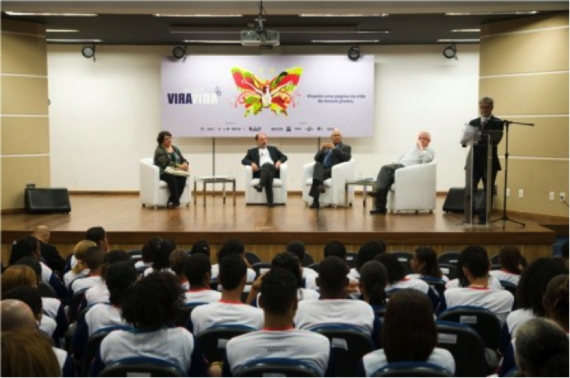Is it possible to completely transform the life of teenager or youngsters and rescue them from extreme poverty, abuse and sexual exploitation? Is it possible to raise awareness of his or her rights and human potential through the tools that allow them to be an active agent change?
These were the questions that Brazil's SESI Council asked in 2008 when it started to develop the founding principals of the ViraVida (turn your life around) program. This program aimed to remove children in vulnerable situations of violence and sexual exploitation from risk, mitigate the psychological damages and give them a new chance at opportunity.
In the last decade, Brazil has employed many efforts to combat this kind of crime, implementing new laws and codes of conduct, multi-sectorial programs and campaigns. But our understanding was that we needed to create a sustainable mechanism able to rescue those teenagers from a permanent situation of abuse, and to give them an opportunity to reconnect with their families and society. In fact, we need an entire community working together.
In partnership with the "S" System (SESI, SENAI, SENAC, SEST, SENAT, SEBRAE e SESCOOP), non-profit organizations, private sectors and governments, we developed a socio-educational process aimed to 16- to 21-year-old boys and girls that combines professional capacitation, basic education and social and psychological support.
The ViraVida program provides education and professional training, with a workload that varies between 700 to 900 hours. The training includes technical courses cover the areas of fashion, tourism, gastronomy, digital communication and administration -- all at no cost.
In addition, students receive medical, dental and psychological support. At the end of the courses the program also counts on a partnership with the private sector to employ the graduates into the labor market, through internships projects and jobs with a formal contract.
The project is present in 23 cities in Brazil, covering 20 different States in Brazil. Recently we are proud to announce that we have assisted El Salvador adopt the program and with the help of the U.N. we plan to continue to provide technical assistance to other countries that are looking for new and innovative ways to battle this societal eroding problem that most countries prefer to simply ignore.
In the four years since creation, more than 3,700 teenagers and youngsters with histories of violence and sexual exploitation have been enrolled in ViraVida.
- 1,854 students completed the program
- 1,159 have already been integrated in the workforce
- The others are participating in selection processes or are being provided with a advanced training programs
- 45 percent increase in the participants wages after graduation, and that for each R1 (Real) invested in the program, there's a return of R1.46 (Reais) to society.
- In-depth interviews with the participants show the program is a great promoter of social change. It also was proven as a strengthener of families and community ties. It was also proven as an effective way to reduce social inequalities
The sexual exploitation of children and youth is one of the most destructive atrocities in the world and one of the worst human rights violations. But the everyday contacts with those kids, and the changes we have witnessed in those communities have reinforced our feelings that programs like this CAN make a difference and that this is more than a social responsibility, it's a debt to the next generation.
